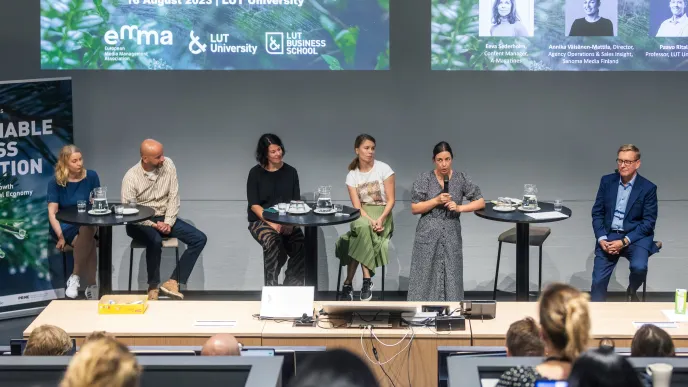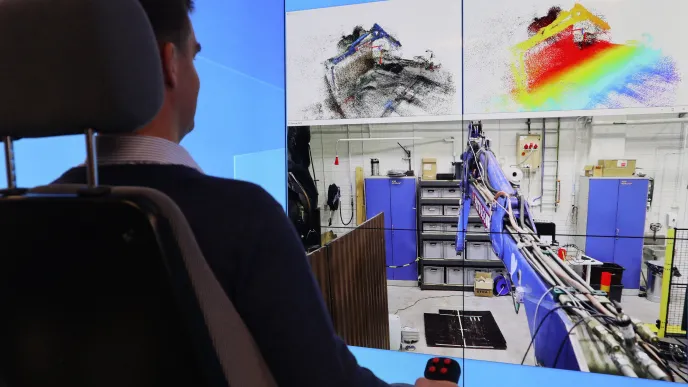Artificial intelligence (AI) is no longer a mere curiosity. The larger public became aware of its concrete possibilities when OpenAI’s artificial intelligence-based chatbot ChatGPT hit the market. However, a significant share of consumer applications has included artificial intelligence for years. For instance, online platforms such as Spotify, Facebook and TikTok make personalized recommendations by employing AI-based algorithms.
“There’s increasing buzz around conversational and generative AI applications, which highlight artificial intelligence. In the past couple of years, people have had access to AI applications that perform well enough to be relevant for professional purposes,” explains Paavo Ritala, professor at LUT Business School.
What can AI be used for now and in the future?
Artificial intelligence is a combination of statistics, salgorithms, and machine learning. It has long been used to process large quantities of data. AI can also automate repetitive routine tasks, such as the identification of defective components on a production line.
Conversational and generative artificial intelligence applications aren’t yet established in all industry sectors, but Ritala maintains that marketing and content production professionals already bounce ideas off of them and use them to come up with new perspectives and content.
In fact, the importance of AI in knowledge work keeps increasing and is starting to affect people's job descriptions.
AI helps improve efficiency in many aspects. In practice, AI is part of the same development trend as digitalization in general.
“An increasing share of products, services, and systems around us utilize digital technology and data, which means that also AI can be used in more and more contexts. One example is robotics. AI has already been embedded into industrial robotics and robotic vacuum cleaners and lawn mowers meant for consumer use, but it will without a doubt also be widely incorporated into systems such as autonomous vehicles.”
What do we need to consider in the development of AI?
AI and technology in general are advancing in leaps and bounds, and keeping abreast of developments requires effort, research, and investments. AI influences corporate activity, daily life, and society and will continue to do so. That needs to be taken into consideration in political decision-making, legislation, copyrights, and information security.
Ritala says that special attention needs to be paid to the green transition. All data processing consumes energy, and therefore, new technology needs to be developed hand in hand with the green transition. Artificial intelligence accelerates industrial productivity and potentially increases our planet’s environmental burden. Therefore, we might fail to take full advantage of its positive features unless we use it to tackle global environmental challenges.
“We need to bear this in mind. It's a question of how we use AI. Do we use it to solve sustainability problems or to increase consumption and production?”
The relationship between AI and sustainability can also be examined from the individual's viewpoint. In the best-case scenario, AI can be a tireless sparring partner that helps pinpoint important elements from the flood of information.
Nonetheless, the flood of information has its perils. Ritala remarks that the world is already drowning in content that is increasing by the minute.
“Even now, our limits are being tested, and a human being’s cognitive abilities can't be scaled endlessly. It’s important to design systems that are natural for humans and promote our well-being.”

How does LUT research AI?
LUT explores artificial intelligence in the fields of technology, business, social sciences, and communication sciences. Technology research focuses on machine learning and simulations, whereas business studies examine how AI has changed knowledge work, and impacts organizations, business models, and revenue models.
For instance, a recent study by LUT Business School reveals a number of uses for generative AI across industries, from software engineering to law firms and consultancies. In addition to Ritala, Junior Researcher Laavanya Ramaul and Industry Professor Mika Ruokonen were involved in the research project.
AI is also an important object of research in social and communication sciences.
“AI is a vast topic in communication sciences because it transforms our communication environment through means such as an information overload, influencing, chatbots, and new marketing and advertising strategies. Social sciences, on the other hand, looks at AI from a wider angle, including its impact on human well-being and societal systems.”
In addition, LUT investigates AI in cross-disciplinary studies. As an example, Ritala raises LUT’s More Sim research platform, which develops simulation-based techniques for industry and design. The platform combines expertise in technology, business, and industrial engineering and management.
The expansive scope of artificial intelligence research shows that we can no longer stop the development or erase the impact of AI. For those who are uncomfortable with the idea of artificial intelligence, Ritala has two words: try it.
“Refusing to use AI is like having said no to email or the internet back in the day.”
More information:






